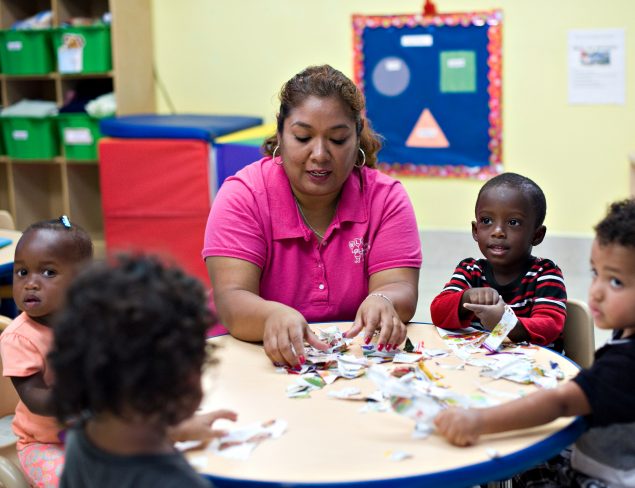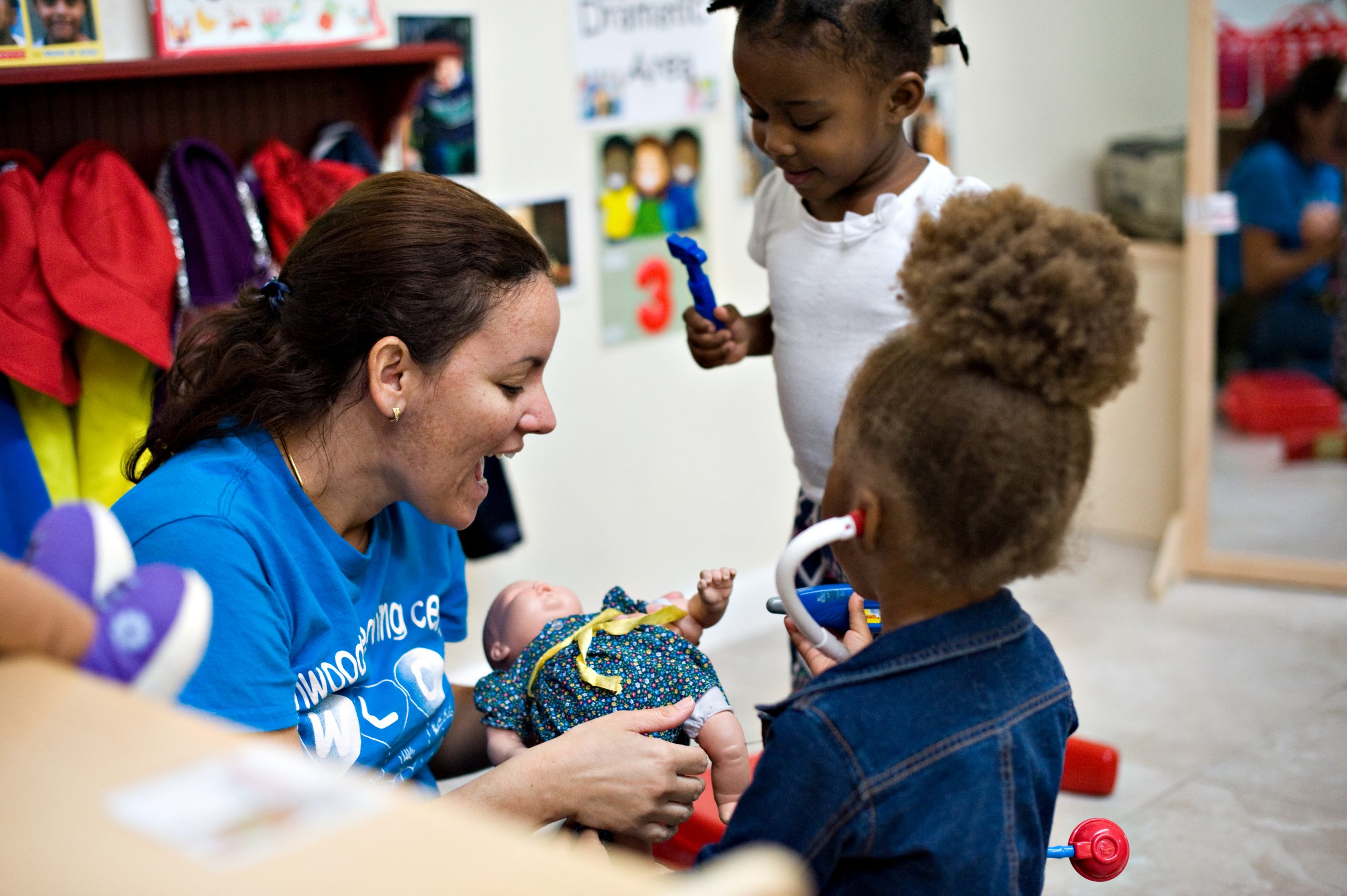
Suspension/Expulsion
Young children who are expelled or suspended are as much as 10 times more likely to drop out of high school, fail a grade, or be incarcerated.

The Long-Term Impact of Exclusion
Suspension or expulsion from an early care and education setting–no matter what it is called–is a significant problem. The stress on young children and their families can have long-term impacts on child outcomes and often leads to future exclusions from school settings.
Take a look at our Point of View on Suspension and Expulsion.
Merely banning suspension and expulsion in early care and education settings does not address the complex nature of the problem. A more thoughtful, multi-pronged state policy approach is needed–one that reflects an understanding of expulsion as a symptom of a set of problems related to quality, equity, and adequate program supports.
Expulsion by many other names….
- Please pick up your child early today
- Don’t bring her in tomorrow
- Let’s try half days for the next several weeks
- The program isn’t a good fit for your child
- We can’t meet your child’s needs
While there are complex reasons for why expulsion and suspension happen in early care and education settings, there is no evidence that they are effective responses to a child’s behavior. Suspension and expulsion are adult decisions and adult reactions to children’s behavior in those settings.
Walter Gilliam’s seminal research notes:
- The rate of preschool children being expelled nationally is triple that of children in K-12.
- Stark racial and gender disparities persist in expulsion rates.
- Black children represent 18% of preschool enrollment, but 48% of preschool children receiving more than one out-of-school suspension.
- Boys represent 54% of preschool enrollment, but 79% of preschool children suspended once and 82% of preschool children suspended multiple times.
- Clearly, state policies on early learning suspension and expulsion either don’t exist or are insufficient.

Suspension/Expulsion Project Goals
BUILD works to reduce suspension and expulsion from early care and education settings. It is detrimental to healthy child development and an issue of significant concern to state early childhood leaders and researchers. It is a quality and an equity issue. It is also an issue that allows us to help state leaders recognize the importance and effectiveness of cross-sector work to support young children and their families.
Our goal is to raise awareness of the many causes of suspension and expulsion and the need for cross-sector, systemic action to reduce and ultimately eliminate suspension and expulsion form early care and education settings.
How BUILD Provides Support
BUILD supports state leaders as they explore the causes of suspension and expulsion and identifies strategies that build off the state’s strengths and supports. Many states, upon learning of the data that demonstrates disparities in punishment, particularly of Black boys, moved to ban expulsion but without providing supports, clear protocols for programs, and due process for children and families. These bans unintentionally drive expulsion practices underground if programs do not have support to identify what is contributing to the challenging behavior and the best course of action.
BUILD helps state leaders think about the policy options, the program supports, and the connection of programs to relevant services that might all be part of a state strategy. And BUILD ensures that these discussions and plans are done in the context of the state’s goals and plans.
Benefits and Accomplishments
- For the Child Care State Capacity Building Center, BUILD created a tool, Building a Comprehensive State Policy Strategy to Prevent Expulsion from Early Learning Settings, that lays out a rubric for policy options to promote young children’s social-emotional development and reduce the likelihood of expulsion and suspension.
- In partnership with the National Center for Children in Poverty we have supported more than a dozen states as they consider how to reduce suspension and expulsion with one-on-one state consultations and cross-state peer learning groups.
- BUILD and NCCP have held webinars open to all 50 states, the territories, and tribes to highlight innovative state work, share our learning, and the approach we recommend.
- Our work with states focuses on program supports such as hotlines and other triage mechanisms, training and coaching, infant and early childhood mental health consultation (IECMHC), and connection to QRIS or other quality improvement initiatives.
- Our work helps states plan data collection and data analysis.
- We support leaders in policy analysis and changes related to increasing ECE programs’ capacity for providing continuity of care, improving adult-child interactions, and investing in quality improvement.
- In Michigan, NCCP and BUILD are helping leaders put strategies in place outlined in our September 2020 report on a statewide survey entitled The Voices of Michigan’s Early Care and Education Teachers: Children’s Challenging Behavior, Expulsion, Disparities, and Needed Program Supports.
- In Oregon, which is using Preschool Development Grant Renewal funds to design its IECMHC model with a focus on race and culture, we are working on legislation with advocates, public sector leaders, the Governor’s Racial Justice Council, and many others.
Explore Suspension/Expulsion Resources
Building a Comprehensive State Policy Strategy to Prevent Expulsion from Early Learning Settings
Website June 22, 2018
Visit this website to download a tool that lays out a rubric for policy options to promote young children’s social-emotional development. It will support the development of state-level strategies to improve early learning settings and provide an approach to preventing suspension and expulsion.
The Voices of Michigan’s Early Care and Education Teachers: Children’s Challenging Behavior, Expulsion, Disparities, and Needed Program Supports
Report September 1, 2020
Michigan leaders and stakeholders are working to strengthen a system of supports for young children’s mental health. This report presents results of a statewide survey on ECE teachers’ experiences related to children’s challenging behaviors and recommendations for further strengthening social-emotional supports for children in Michigan’s ECE settings.
Summary of Research on the Dimensions Contributing to Expulsion and Suspension in Early Childhood Settings
Report March 1, 2021
As States and Territories consider strategies to prevent and ultimately eliminate expulsion and suspension in the early years, they need to explore why early learning programs suspend or expel young children. This document summarizes the four dimensions of the problem: 1) the structure of quality with policies that increase the likelihood of expulsion and suspension; 2) the absence of deep understanding of child development, 3) racial disparities in discipline, and 4) young children who need more and different support than can be provided by an educator or an early learning setting alone.
Suspension/Expulsion Team
Carey McCann
Co-Director of State Services
